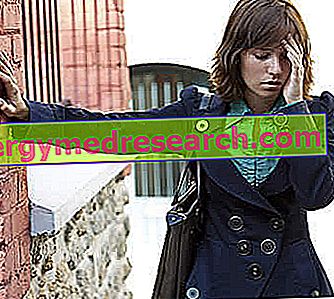Generality
Dizziness is a symptom in the presence of which the victim has the impression that the surrounding environment moves or rotates all around.
To cause vertigo can be a problem of the vestibular apparatus of the inner ear (peripheral vertigo), or a problem based in the brain (central vertigo).

Often, vertigo sufferers also experience other symptoms, including nausea, vomiting, loss of balance, nystagmus, sweating and / or hearing loss.
In order to treat vertigo correctly, it is essential, during diagnosis, to identify the precise causes.
What are vertigo?
Vertigo is a symptom for which the victim has the feeling that the environment around him moves or rotates.
ORIGIN OF THE NAME
The term "vertigo" comes from the Latin verb " verto ", which in Italian means "to turn" or "to rotate on oneself".
Causes
Dizziness may occur as a result of a problem with the vestibular apparatus of the inner ear, or due to a problem affecting the brain .
Vertigo resulting from an alteration of the vestibular apparatus - which is the organ of balance - is called peripheral vertigo .
The vertigo that, instead, derives from a problem of the encephalon - to be precise, or the cerebellum or the brainstem - are better known as central vertigo .

CAUSES OF PERIPHERAL VERTEINS
The most common causes of peripheral vertigo are:
- The condition is known as benign paroxysmal positional vertigo or VPPB .
Benign paroxysmal positional vertigo is by far the most common cause of vertigo.
According to reliable scientific studies, the onset of vertigo in BPPV sufferers would be due to the formation of calcium carbonate crystals, within the semicircular canals constituting the vestibular apparatus. With their movement, these calcium carbonate crystals would compromise the proper functioning of the organ of balance and would cause the typical sensation of the surrounding environment that turns.
More common in the elderly population, the BPPV tends to arise without particular reasons; however, in rare circumstances, it appears after: an ear infection, an ear surgery, a head injury or a long period in bed (for example due to a serious illness).
- Labyrinthitis .
The labyrinthitis is the inflammation of the labyrinth, that is the set of all the semicircular canals that make up the vestibular apparatus of the inner ear.
In general, labyrinthitis occurs following a viral infection (a cold or flu) or bacterial (otitis); more rarely, it can result from a head injury or an allergic reaction.
Labyrinthitis is a cause of vertigo because, in the presence of an inflammation against it, the labyrinth works inadequately and sends wrong signals to the brain.
- Vestibular neuronitis .
Vestibular neuronitis is the inflammation of the nerves that connect the labyrinth to the brain and allow precise regulation of balance.
With their inflammation, the aforementioned nerves function incorrectly, inadequately transmitting the nerve signals traveling the "vestibular apparatus - brain" pathway.
Usually, vestibular neuronitis has a viral origin.
- Ménière's syndrome .
Ménière's syndrome is a disease of the inner ear, which, according to the most reliable hypotheses, would arise due to an accumulation of endolymph inside the labyrinth. The endolymph is the liquid present inside the semicircular canals of the vestibular apparatus, which plays a fundamental role in the transmission of nerve signals for the regulation of balance.
- Taking certain types of medicines .
In these situations, vertigo represents a possible adverse effect linked to the intake.
CAUSES OF CENTRAL VERTEINS
Among the most common causes of central vertigo are:
- Migraine .
It is a pathological condition characterized by unilateral headaches (ie on only one side of the head), which tend to worsen and are capable of causing intense and throbbing pain.
- Multiple sclerosis .
It is a chronic and debilitating disease that occurs due to the progressive degradation of nerve cells (neurons) in the central nervous system.
- The acoustic neuroma (or vestibular Schwannoma ).
It is a benign brain tumor that affects the Schwann cells of the VIII cranial nerve (or vestibulocochlear nerve). The VIII cranial nerve is a sensory nerve that controls hearing and balance.
- Brain tumors, located in the cerebellum (cerebellum tumors).
The cerebellum is one of the four regions that make up the brain. His job is to coordinate body movements.
- An episode of stroke or TIA .
The term stroke and its numerous synonyms - including stroke, cerebral infarction and stroke - indicate an interruption or a sharp reduction in blood supply to an area of the brain. This lack of adequate blood supply results in the progressive death of the affected brain region.
A TIA, or transient ischemic attack, is a stroke characterized by a temporary interruption of blood supply.
- Taking certain types of drugs .
In these circumstances, vertigo represents a possible adverse effect arising from the intake.
To learn more: Vertigo - Causes and Symptoms
Associated symptoms
Often, several other symptoms are associated with vertigo, including:
- Loss of balance
- Nausea
- Headache
- Sweating
- Nystagmus
- Tinnitus (or tinnitus)
- Hearing loss
- Sense of general malaise
In some individuals, the sensation induced by vertigo and the accompanying symptoms may be just mentioned; in other people, however, they can also be very marked and severe.
DURATION
Vertigo and associated symptoms have a variable duration from patient to patient: in some subjects, they may vanish after a few seconds / minute; in others, however, they can also last for several hours, if not days.
On the duration of vertigo and accompanying manifestations, the type of triggering causes generally affects.
HOW DO I COMPARE?
Depending on the triggering conditions, vertigo may appear suddenly or gradually.
WHEN TO REFER TO THE DOCTOR?
It is good to consult a doctor when vertigo is a recurrent / persistent symptom or when it occurs very markedly.
SYMPTOMS OF BENIGNA POSITIONAL PAROSSIST VERTIGINE
Since benign paroxysmal positional vertigo is the most common cause of vertigo, it is worth remembering what are the other characteristic symptoms of this particular medical condition:
- Nausea;
- Loss of balance;
- Nystagmus and other visual disturbances. The presence of nystagmus in an individual is often a sign of a problem at the level of the organ of balance;
- Vomiting (rarely);

- Presincope or syncope (rarely).
Diagnosis
When dealing with an individual who complains of vertigo, doctors generally proceed as follows: first, they submit the alleged patient to a short questionnaire; after which they perform a thorough physical examination and carefully analyze the clinical history (medical history); finally, based on the symptoms and what emerged from previous assessments, they prescribe more detailed examinations.
SURVEY
For patients complaining of dizziness, a doctor usually asks:
- A description of the first episode of vertigo.
- A description of any associated symptoms. In these situations, it is particularly important for the doctor to know if the patient has suffered from hearing loss, tinnitus, nausea and / or vomiting.
- How frequent are episodes of vertigo and how long they last.
- If episodes of vertigo affect the performance of normal daily activities, such as walking, working, etc.
- If there are particular gestures or movements that worsen the symptoms. For example, a particular movement of the head or getting up quickly from a chair or bed are two acts often associated with a worsening of the symptom picture.
- If there is something that improves the symptoms, when these are in place.
EXAMINATION OBJECTIVE
The physical examination represents the first step towards identifying the condition that triggers the episodes of vertigo.
When executing it, the doctor visits the patient, evaluating the symptoms.
Internal analysis of the ears and tests for nystagmus are two key points of the physical examination.
FURTHER EXAMINATIONS
With the prescription of more thorough examinations, doctors are often able to trace the causes of vertigo .
The knowledge of the triggers allows to plan the most appropriate therapy for the case in question.
Among the in-depth exams, there are:
- Several hearing tests (or audiometric tests ). They clarify if the patient suffers from tinnitus and / or hearing loss.
- Videonistagmography and electronistagmography . There are two tests for the detailed analysis of nystagmus signs. Both require the patient to wear special glasses and observe moving objects.
- Thermal tests for the ear . They foresee the introduction into the patient's ear of warm or cold solutions (or, alternatively, of hot or cold air), in order to see how temperature changes affect the organ of balance, located at the level of the ear indoor.
They are painless tests, but they cause dizziness.
Generally, the introduction of warm or cold (or air) solutions into the ear takes about 30 seconds.
- A posturographic examination . It involves the use of a particular machine that evaluates the patient's ability to balance, providing useful information about vision, proprioception, etc.
- Diagnostic imaging tests . Generally, the most practiced are CT and nuclear magnetic resonance (NMR). CT and MRI are painless procedures, which provide the doctor with detailed images of the internal organs and tissues of the human body.
Unlike MRI, the CT scan is mildly invasive, as it exposes the patient to a non-negligible dose of ionizing radiation.
Treatment
Treatment of vertigo depends on the triggers and the severity of the symptoms.
labyrinthitis
There are no special treatments for viral labyrinthitis; in these situations, the only medical indication is to stay at rest, waiting for the infection to heal spontaneously.
The case of bacterial labyrinthitis is different: this condition requires the administration of antibiotics . To learn more: Labirintite cure drugs.
In all those circumstances in which the labyrinthitis has impaired hearing ability, it is advisable to consult an expert in ear diseases and hearing disorders to receive the most appropriate treatment for the case.
Some forms of labyrinthitis require the use of a treatment known as vestibular rehabilitation.
Brief discussion: what is vestibular rehabilitation?
Vestibular rehabilitation essentially consists of a program of exercises whose purpose is to induce an adaptation, by the brain, to the vertigo present.
In other words, it is a treatment aimed at accustoming the brain to abnormal sensations present during an episode of vertigo.
VESTIBULAR NEURONITE
Following usually a viral infection, vestibular neuronitis is a condition that generally tends to heal spontaneously, without any particular treatment.
The healing path could last several weeks.
When vertigo is particularly severe and associated with annoying symptoms (vomiting, nausea, etc.), doctors recommend lying in bed until they are concluded and, in some cases, taking certain medicines, such as prochlorperazine and antihistamines.
In the presence of a vestibular neuronitis, drinking alcohol and getting excessively tired is highly discouraged.
BENZNA POSITIONAL PAROSSIST VERTIGINE
Generally, people with positional paroxysmal vertigo heal spontaneously over several weeks or months.
According to experts, the resolution of BPPVs is linked to the dissolution of calcium carbonate crystals, circulating in the semicircular canals of the vestibular apparatus.
However, it is good to point out that, to speed up the healing process and to improve the symptomatology, doctors recommend:
- Get up slowly from the bed
- Avoid looking upwards, so avoid activities that can lead to such a gesture.
- Undergo the Epley maneuver . The Epley maneuver consists of 4 specific movements of the head, the purpose of which is to move the calcium carbonate crystals and position them in points that are harmless (or at least less influential) from the symptomatic point of view.
- If the Epley maneuver is poorly performed or cannot be performed due to patient neck problems, practice Brandt-Daroff exercises .
If the Epley maneuver and the Brandt-Daroff exercises are ineffective, if the symptoms do not hint at improving and if other disorders still appear, it is appropriate to turn to the specialist again and rely on his indications.
IT IS SYNDROME OF MÉNIÈRE
There are various treatments for vertigo induced by Ménière's syndrome.
Possible treatments include:
- Adopting a low-salt diet . To learn more, read: Diet for Ménière's syndrome
- The intake of prochlorperazine, cinnarizine and cyclizine, for the treatment of vertigo and some symptoms such as nausea and vomiting.
- Intake of betahistine, gentamicin, diuretics and beta-blockers, to prevent vertigo. To learn more, read: Medicines for the treatment of Ménière's syndrome
- Sound therapy
- The use of hearing aids for the treatment of tinnitus
- Physiotherapy, to improve balance abilities.
- The use of hearing aids.
CENTRAL VERTEINS
Since migraine represents the main cause of central vertigo, in this section we will limit ourselves to a quick description of the treatment envisaged in this circumstance.
The treatment of migraine generally involves the administration of a series of drugs, to alleviate the painful symptoms and to prevent headache attacks.
The reader willing to learn more about it, can consult the article present here.
In depth:
- Cures and medications for the treatment of multiple sclerosis.
- Cures and medications for the treatment of stroke.
- Treatment and drugs for the treatment of TIA.
WHAT TO DO DURING AN ATTACK?
Generally, during a vertigo attack, it is advisable to lie down in a quiet, dimly lit room. This should mitigate the feeling of the environment that is spinning and also the nausea.
WHAT TO DO TO PREVENT / AVOID A DETERIORATION OF SYMPTOMS?
In general, to prevent or prevent worsening of vertigo, doctors advise to avoid, as far as possible, stressful situations that cause anxiety.
Prognosis
Prognosis in the case of vertigo depends on the severity of the triggering causes and their curability.




